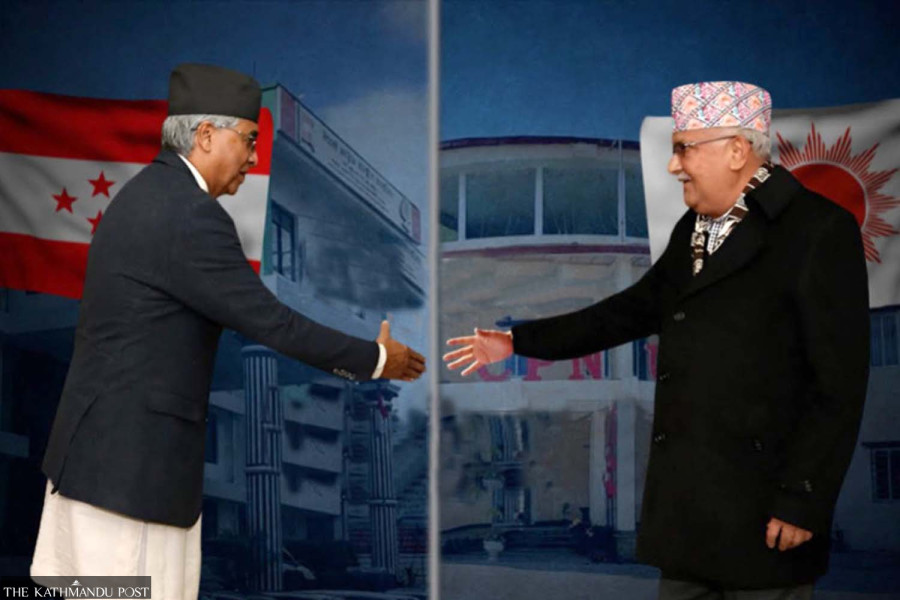Columns
Caught between the winds
Congress struggles to reclaim its democratic identity amid political unpredictability and opportunism.
Sanjeev Satgainya
Political predictions are a tough affair, more so in Nepal, where no one knows which way the wind will blow. Even those who keenly follow developments are often surprised by what Nepali politics dishes up—almost every day.
About six and a half months ago, it looked like the communist combo of the CPN (UML) and the Maoist Centre was doing just fine—in terms of bonhomie rather than governance. Yet, leave aside the analysts, even party members were taken by surprise when UML Chair KP Sharma Oli and Nepali Congress President Sher Bahadur Deuba reached an agreement to form a new coalition to rotate the prime ministership. They tossed in a pretext of constitutional amendments, only for Prime Minister Oli to proclaim five months later that it was not possible until 2030. The reason: The numbers were not sufficient.
Then, one fine day, the UML-Congress government suddenly woke up to realise that the country was sorely lagging behind in development. So the Oli government issued a raft of ordinances, which some Congress leaders, who once opposed such moves as undemocratic, took pains to defend. Days later, it dawned upon them that, though their government was “pretty strong,” they lacked the numbers in the National Assembly to get the ordinances accepted.
Myopic politics
The two incidents suggest that the politics of the two largest parties completely revolves around quick fixes. They are setting short-term goals, which, too, they have been finding hard to achieve. Politics needs a forward-looking approach, where they are failing. These parties’ obsession with power is apparent from the fact that they do not even have a grasp of the numbers required for certain parliamentary proceedings—like constitutional amendments and ordinance approvals.
This is not an important question yet.
What is concerning is that Nepal’s big parties are undermining fundamental democratic principles clearly laid out in the constitution. It’s the UML and the Congress now. A few months ago, it was the Maoists and the UML. Before that, it was the Congress and the Maoists. The Machiavellian games since the 2022 elections have been in full public view, with the wily Oli emerging as the clear winner so far, and Deuba, so far, happily playing second fiddle.
The events of the last three years have shown that Nepali parties have increasingly developed an inclination to control rather than govern. They are covering up such tendencies with “stability,” a more sellable refrain in contemporary Nepali politics.
Underlying risks
If one were to recall, the Nepali Congress and the Maoist Centre fought the 2022 elections under an alliance to continue the coalition post-elections. After Maoist Chairman Pushpa Kamal Dahal abandoned Deuba to side with Oli to secure the prime minister’s post, the jilted Congress should have stayed in opposition. But in an uncanny display of undemocratic characteristics, it voted in favour of Dahal when he sought a confidence vote. The Congress sowed the seeds of opposition-led politics. When the UML pulled out of the Dahal government, the Congress found some vindication as it became the key coalition partner—oblivious to the fact that the Maoist chair was set to ditch the grand old party one more time.
With just 32 seats, a smug Dahal acted like a seasoned funambulist walking between the two poles of Nepali politics, causing great inconvenience to the two large parties, ultimately setting the stage for his downfall.
The coming together of the UML and Congress—and their promise to stick together—may have given the impression that there will be a stable government until the next elections, but no one knows what they actually are plotting.
Many may be relishing Dahal’s ouster, with some even not hesitating to write his political obituary, but what is also true is that the current coalition of the two largest parties has rendered Parliament almost opposition-less. In doing so, they seem to have completely ignored that democracy is not just about government; it’s about accountability, too. Since Parliament is where the government of the day is held accountable, a weak opposition poses great risks to democracy.
What’s also worrying is that the Congress and the UML are even envisioning a two-party system. Translating this idea into reality is not easy, but such an intent by the two democratic parties—especially with Congress projecting itself as more democratic than the UML—is fraught with risks.
UMLisation of Congress?
The Nepali Congress, the champion of multiparty democracy that had raised concerns about opposition-less politics a year or so ago, now appears to be under the complete spell of Oli, whose authoritarian tendencies were evident during his previous tenure.
Oli is known for his aversion to critics and dissenters, and his government’s recent move to introduce a bill to “regulate” social media is widely seen as an attempt to curtail free speech.
Coalition politics demands compromise—it’s a given. But is Congress willing to stoop so low as to trade away its democratic credentials, freedom of expression and a free press? It is appalling that the grand old party is divided—and mired in a dispute—over when it should hold its general convention, despite the party statute clearly laying out the calendar.
Internal feuds are common in political parties, but the Congress takes pride in exercising internal democracy, unlike the UML under Oli. The shared interest of Deuba and Oli is the only glue keeping the Congress and the UML together. Deuba, who was born the same year the Nepali Congress was founded by BP Koirala in 1946, is in the fag end of his active political career. It is incumbent upon Congress, as a party, to safeguard the democratic ideal and preserve the flame of democracy.
It’s a pity that the grand old party is so badly bogged down that it is struggling even to navigate its own ideological path. The party at large knows that an alliance with the UML—Oli, for that matter—is rooted in Deuba’s compulsion rather than the party’s. But can the party afford to be UMLised? It still has to hold its general convention sooner rather than later and go to the people as well—2027 is not very far.
Congress stands at a crossroads. But should the Congress, like the rest of Nepal’s political landscape, leave itself at the mercy of the wind? Its current coalition with the UML is clearly formed out of convenience rather than conviction. The Congress needs to put its act together, find its footing, and reclaim its democratic identity to avoid being swept along by the waves of opportunism. With ideological lines blurred, it is not easy to predict the direction of the wind. The Congress needs to prepare itself to navigate the wind.




 18.12°C Kathmandu
18.12°C Kathmandu















